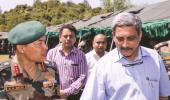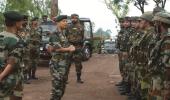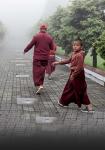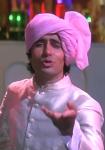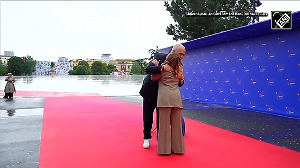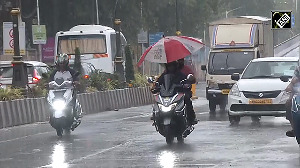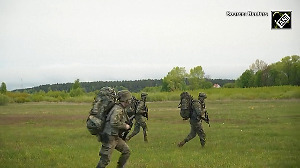'Our defence services are in a position to checkmate any Chinese adventurism.'
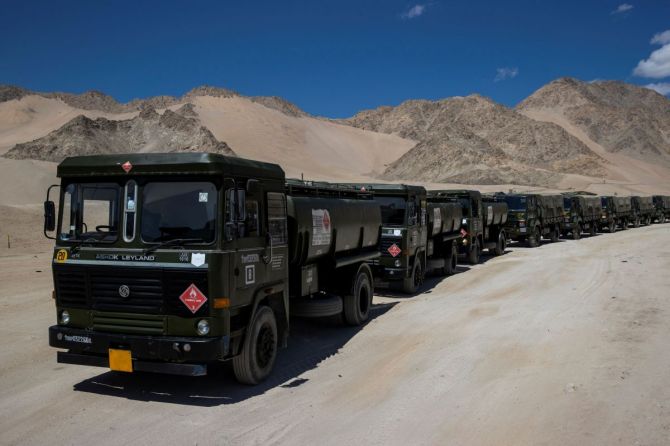
As a little boy in a remote village of Manipur, Lieutenant General Konsam Himalay Singh's first ever ambition in life was to be a brigadier in the Indian Army.
He went on to surpass that goal and became the first ever lieutenant general from the North East.
The officer retired after 40 years of distinguished service during which he led an Infantry Battalion during the Kargil War and commanded a battalion in the highest battlefield of the world, the Siachen Glacier.
Later, he commanded an Infantry Division and a Corps in the Line of Control facing Pakistan and also oversaw Counter Terrorist Operations in Jammu and Kashmir.
On his retirement, he returned to Manipur thereby fulfilling a promise he had made to former President A P J Abdul Kalam.
The promise was made when his formation in Delhi had the honour of hosting President Kalam for a few months until the completion of the repair works of the house allotted to him in Lutyen's Delhi after he left Rashtrapati Bhavan.
President Kalam wanted him to contribute his vast experience towards betterment of the Manipuri people. General Singh was chairperson of the Manipur Public Service Commission and is a member of the state's consultative group on Naga Talks.
The general has recently written a book Making of a General - A Himalayan Echo, a memoir of a soldier's life with the challenges ahead of the Indian Army.
Lieutenant General K Himalay Singh, PVSM, UYSM, AVSM, YSM, spoke to Rediff.com's Archana Masih about the serious situation on the Pakistan and China borders, the valour of his unit during the Kargil War and what sets the Indian Army apart.
In your 40 years of service, you have spent 10 years on the Line of Control. In light of the situation hotting up in the last few weeks, do you feel Pakistan is upping the ante to keep India occupied now that we have a problem on the Indo-China border?
Keeping the LoC hot and active is in Pakistan's interest, not ours.
The Pakistan army has many reasons to keep the LoC alive. Most of those reasons are internal, while others are external. Pakistan's longstanding aim has been to wrest Kashmir, therefore, they keep the LoC active at all times.
Hence, India has to be more proactive -- diplomatically and militarily -- to ensure that the cost to Pakistan for upping the ante is unbearable.
What do you think should be the way forward on the LoC, keeping in mind the stand-off with China?
We are involved in a very serious situation on both the fronts: China as well as Pakistan. While we can deal with Pakistan militarily in the conventional sense, they have some advantage on the LoC because of their proximity with several village settlements all along the LoC.
The Pakistanis mix their troops with the local villagers, while the Indian Army tries to avoid any collateral damage to the villagers of the other side.
The Pakistan Army takes full advantage of that and carries out multiple infiltration attempts or sniper attacks by mingling themselves with the civilians bang on the LoC and therefore uses this to their advantage.
The Indian response should be and has been to inflict such cost on them militarily that they are not able to withstand the Indian response and it is cost prohibitive for them to indulge in such activities on the LoC.
The Indian Army has the capability and has been keeping the Pakistan Army on the LoC under full domination. There have been casualties on our side which are very unfortunate, but I know the Indian Army is doing a great job.
I would like to give big sabashi to the soldiers who are facing Pakistan's belligerence every day on the LoC.
My first book Romancing the Line of Control was written because I wanted people to know what the LoC was.
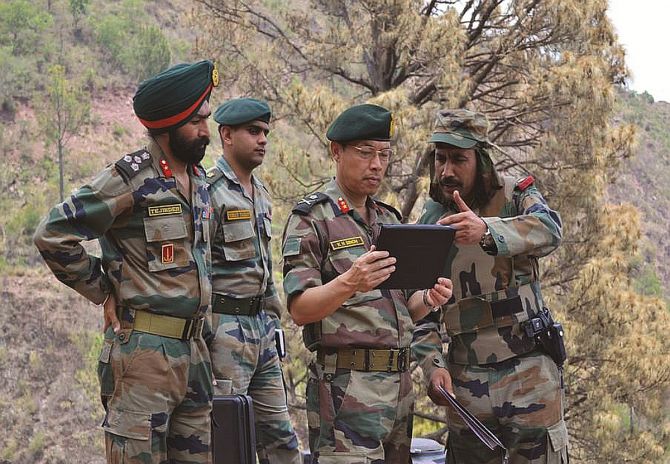
What was your own experience of your years of serving the country on that front?
I first went there as a young Second Lieutenant 43 years back with one star on my uniform and I last was there as late as 2015.
I spent some of my most memorable days on the LoC. I have mentioned in my book an incident when with the then Captain V K Singh -- who is now a minister (General V K Singh (retd), the former army chief) -- when we almost walked into a Pakistani bunker!
As company commander I had a soldier whose evacuation had to be arranged because he had been attacked by a bear. The soldier did not know that a bear was on the rock beside him and he passed him a cigarette!
I look back at the operations conducted against militants -- fighting them and trying to capture them.
I have had a dramatic journey on the Line of Control. I have only fond memories.
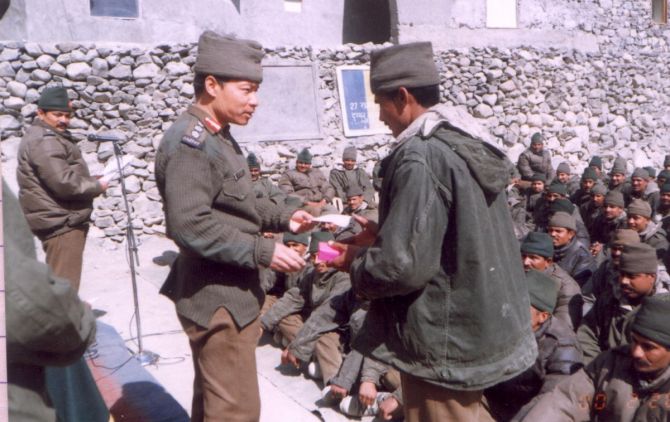
You mention your unit, 27 Rajput's valour and accomplishment in the Turtuk-Siachen sector did not get its due in the Kargil War and that the media focus was on Drass-Kargil sector. Can you tell us the untold acts of valour in recapturing peaks that prevented Pakistani designs to threaten our positions in Siachen?
I won't say they did not get their due because I truly believe in nishkam karm -- 'do your duty'. Awards actually don't matter at all. Medals are only pieces of metal.
In hindsight, I felt that maybe my boys and my unit should have got a little more recognition. In the fog of war some perceptions of the higher HQs change.
I have written about this in my book because it was in the back of my mind that there were some soldiers who did not get noticed and could have been recognised little more appropriately.
Why do you think India should sheds its policy of underplaying the Chinese threat and assert its authority? With the continuing standoff, how do you see the coming months unfolding?
My assessment is that if the Chinese Military Commission, which is headed by Xi Jinping, feels that India will continue to be a competitor, they will play all their cards to keep India below par.
They will try to do this by various means, whereby the military means will be the main instrument.
So, in short, I feel that this standoff will not get over so soon.
There was a time when the Chinese military capability was much better than ours. How do both our militaries match up in equipment, capability and preparedness?
They may have a larger force, but that does not necessarily mean that they can pressurise us. On the India-China border, our defence services are in a position to checkmate any Chinese adventurism.
Do you feel that the LAC is going to be as heavily defended as the LoC?
It is not necessarily to further increase the boots on ground, but to enhance our defences technologically is the key. We have to boost our space and cyber capabilities and enhance various other operational methods.
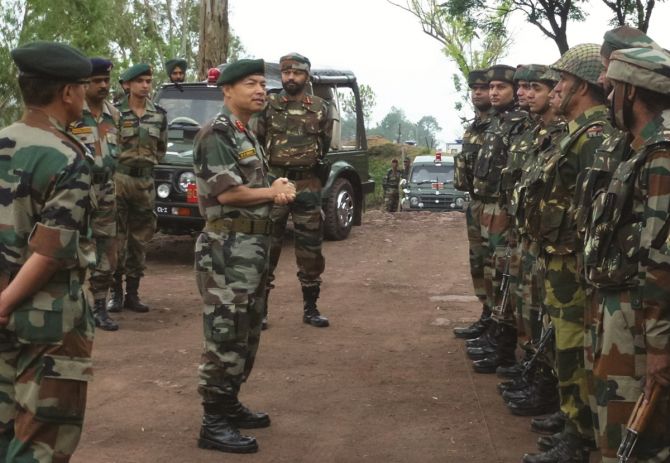
You also feel that our troops have to be warriors against any forms or types of war -- contact or non contact. Do you think our officers are provided adequate courses and training to be such kind of warriors?
I can only say that we try our best, but the nature of war is changing very fast. We have to be ahead of rather than trying to catch up.
What are some of the aspects of the Indian Army that sets it apart and other armies?
We are a professional army.
We are a voluntary army, unlike China.
We are a very well-led army.
We have very motivated soldiers.
These are the strength of our army.
Being an officer of the Indian Army is not like any other job; an officer has to be able to lead his men into hell and get them all of back to safety.
Even if you lead 10 men or 30 or 10,000 that responsibility is a never ending and you have to aspire to be a perfect leader. So, there is always room for improvement.
In that context, it is the endeavour of the senior officers to make sure that they groom younger officers.
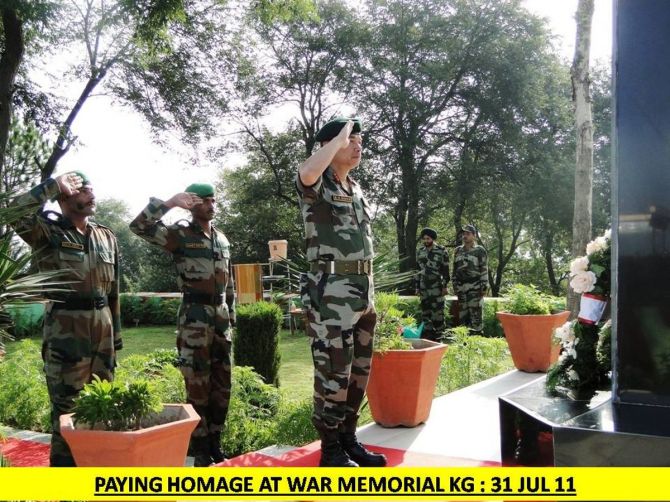
In your career you have seen both Pakistani and PLA troops. What is the difference between the two adversaries?
Other countries have an army, but the Pakistan army has a country. They feel that they are the conscience keepers of Pakistan as a nation.
Similarly, Chinese troops serve the Communist party, not the country. They also have a system of conscription.
Pakistani troops are good fighters, but lack the leadership. They are not well trained and not well-led.
As individual fighters, I consider Pakistanis are better combatants than Chinese troops. Though the Chinese troops have access to better technology.
As an officer who has served in the Siachen Glacier, what are the top most things the people of this country need to know about the importance of the glacier and the need to hold that frontier in such extreme conditions?
The one line answer is that the Siachen Glacier has to be defended by us in the overall context of Jammu and Kashmir and the motive pursued by Pakistan. We have to show our presence on the ground that we are in control and Jammu and Kashmir belongs to us.
In order to do that we have to be in Siachen Glacier.
The Indian Army is trained and very highly motivated to defend this frontier.
You returned to your home state Manipur after retirement, what are some of the challenges there that need to be addressed?
The top most issue is that the governance deficit has to be addressed where required.
Two, violence and insurgencies of the past have reduced considerably, but peace has not really returned in the mind of the people. Peace does not mean the absence of violence. Ethnic issues still persist.
Peace has to be felt in the environment and people must feel that they will get justice and have an equal stake in the governance.
Third, more connectivity and emotional integration with the rest of the country.
Feature Presentation: Aslam Hunani/Rediff.com


